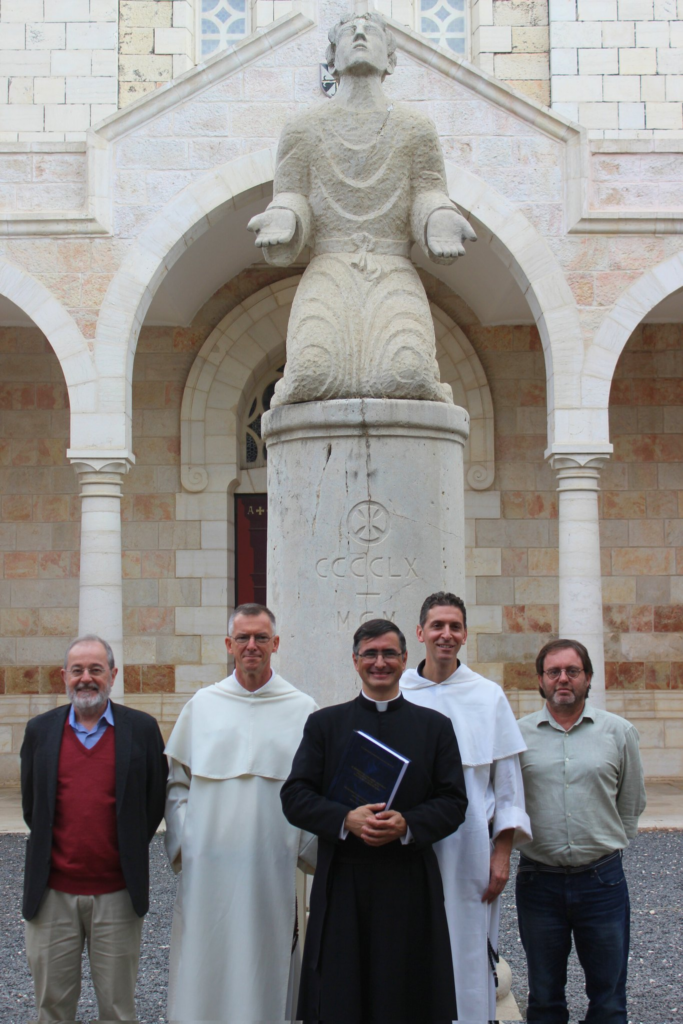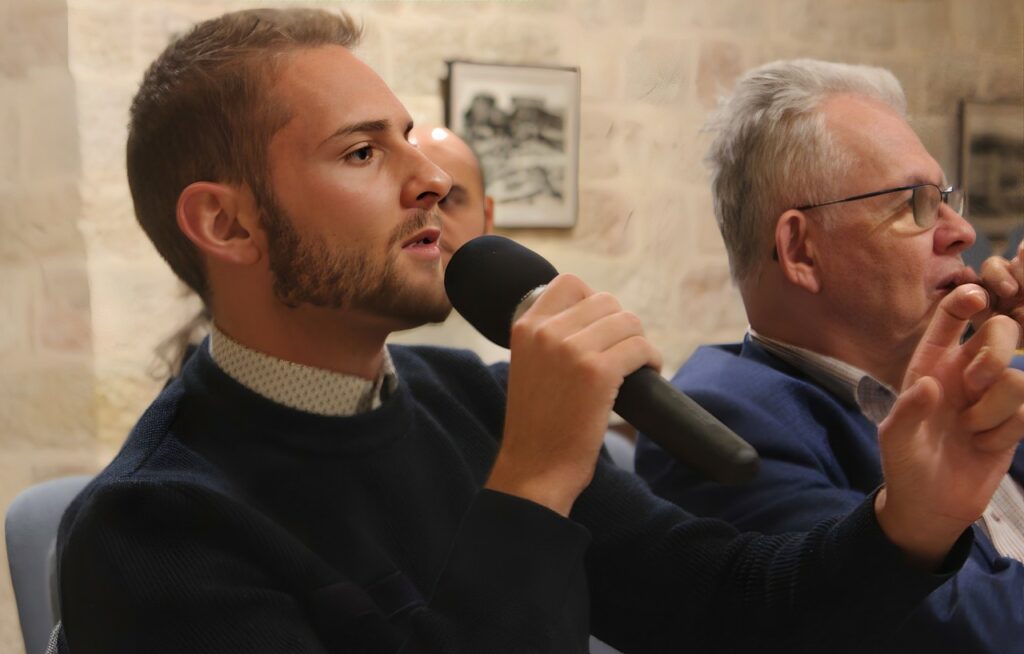Le désir de Dieu dans la réception du Cantique des cantiques.
By Christophe Rico, dean of the Polis Institute, ordinary professor at EBAF and PhD in Greek Linguistics.
Le désir de Dieu dans la réception du Cantique des cantiques.
By Christophe Rico, dean of the Polis Institute, ordinary professor at EBAF and PhD in Greek Linguistics.
ORDINARY PROFESSOR of General Linguistics; Semantics, Greek Linguistics; Greek koinè; Greek New Testament; Theory of translation and pedagogy of ancient languages,
Dean of Polis Institute,
Member of the editorial board of the Revue Biblique.
⇒ Contact: ricochristophe@gmail.com
Born in 1962 in Spain.
MODERN LANGUAGES
– French (read, written, spoken)
– Spanish (read, written, spoken)
– English (read, written, spoken)
– Modern Hebrew (read, written, spoken)
– Arabic dialect of Jerusalem (spoken)
– Italian (spoken)
ANCIENT LANGUAGES
– Ancient Greek (read, written, spoken)
– Latin (read, written, spoken)
– Ancient Hebrew (read)
Academic degrees
1985: MA in Greek Linguistics (University of Aix-Marseille III)
1990: Agregation of grammar
1992: Doctorate Thesis in Greek linguistics (Paris IV)
2011: Authorization to conduct research (University of Strasbourg)
Since 1993: Professor of Ancient Greek and Greek Semantics at EBAF
Since 1995: Associate Professor at the University of Strasbourg
1993-2001: Professor of Latin and French at the Lycée Français de Jérusalem
2001-2008: Visiting Professor at the Department of French at the Hebrew University (Jerusalem)
Since 2011: Dean of the Polis Institute
Current Research Locations
Since 1993: École biblique et archéologique française de Jérusalem
Since 2011: Institut Polis
On Thursday, February 27, 2025, Fr. Dominic Okoye, OP, successfully defended his thesis: The Rhetoric of “Innocent Blood” language in the Manasseh Narrative (2 Kgs 21: 1-18).
In front of the academic community of the École Biblique et Archéologique Française de Jérusalem and participants from other institutions, the friar from the Dominican province of St. Joseph the Worker (Nigeria, Ghana) brilliantly presented the fruit of his years of research and responded to his examiners’ questions and criticisms with concise, well-argued answers. “The analysis of Bible history through the prism of rhetoric is what makes your thesis particularly interesting,” said one member of the jury.
The jury, chaired by ÉBAF director Fr. Olivier Poquillon, OP, included Dr. Peter Zilberg (Bar-Ilan University) second reader, Dr. Blažej Štrba (visiting professor at the Studium Biblicum Franciscanum), Dr. Barbara Schmitz (distance learning, professor at the University of Würzburg), and finally Fr. Martin Staszak, OP, prior of the Convent of St. Stephen and thesis director. As Fr. Martin recalled, the idea for this thesis emerged in Rome, during a meeting between the two brothers at the Pontifical Biblical Institute, where Fr. Dominic was then studying.
|
While the subject may seem very circumscribed, it nevertheless combines several fields of research. The central pericope belongs to the Deuteronomistic writings, with their multifaceted, composite presentation of Israel’s history from a religious perspective. However, this historiography does not really correspond with factual history. Manasseh, religiously compromised and tolerant of Assyrian worship in Jerusalem, nevertheless succeeded in making the country prosper through this Realpolitik. Is the reproach of having filled Jerusalem with innocent blood nothing more than a rhetorical accusation?
|
|
To study the Deuteronomistic work, Brother Dominic therefore turned to the analysis of rhetorical techniques and the study of Akkadian language and culture, including the social and economic realities of Judea in the 7th century BC. It is also by confronting these elements with archaeological data that Brother Dominic has developed his literary analysis in all its complexity.
|
|
Graduating insigne cum laude, fr. Dominic is a good illustration of the unique advantages offered by the ÉBAF for the successful completion of theses in biblical sciences.
Interested in a research grant at ÉBAF? Click here to apply.
Support the ÉBAF
On Saturday 18 January 2025, accompanied by a team from the ÉBAF, around twenty participants took to the desert road to the lowest and oldest city in the world: Jericho.
The group spent the day in this arid area, which was home to both the Old and New Testaments, alternating between sites in the city centre and monasteries carved out of the mountainsides.
Thanks to the explanations of Dr. Christophe Rico, Professor of Linguistics at the ÉBAF and Dean of the Polis Institute, the participants were able to compare the biblical texts on the places where these passages of Scripture are said to have occurred.
Along the way, we were able to examine remains with writing in Hebrew, Greek and Arabic, all translated by Dr Christophe for everyone’s understanding.
|
|
The highlight of the expedition: the road leading to the Greek Orthodox monastery of Saint-Georges-de-Koziba, between Jerusalem and Jericho, has finally reopened after months of closure! ‘I’ve been to Jericho before, but this is a first!
Known for its unique architecture, this monastery, dug out in 476 AD in the dry area of Wadi Qelt, evokes Psalm 23: ‘Even though I walk through the darkest valley, I will fear no evil, for you are with me, your rod and your staff, they comfort me’.
|
|
Initially launched by Fr. Marcel Sigrist, o.p., the Saturday visits are a convivial opportunity to discover the riches of the Holy Land, accompanied by researchers from the ÉBAF.
If you would also like to take part in the Saturday visits, please register by sending an email to lesvisitesdusamedi@gmail.com.
You can find this proposal and many others on our website and on our social networks.
Do you appreciate the work of the ÉBAF? Make a donation to support its activities.
Thursdays’ lectures get to see René Elter speaking of “Transmission and new dynamics of the archeological research in Gaza.” René is an archeologist-researcher associated to the ÉBAF and the IFPO. Program director of Intiqal, an initiative made possible by the General Consulate of France in Jerusalem, the Chateaubriand French Institute of Jerusalem, the Agence Française de Développement, Première Urgence internationale and the British Council. He introduces all the efforts made by his teams since the project has begun.
Click on this link to watch the lecture.
Father Cristóbal VILARROIG MARTÍN, L.C., defended his doctoral thesis at the ÉBAF after years of research. His presentation convinced the members of the jury, who awarded him the insigne cum laude distinction. Congratulations!
 Photo: ÉBAF, Ordo Prædicatorum.
Photo: ÉBAF, Ordo Prædicatorum.
He talks about his thesis and why he chose the ÉBAF as his place of work.
“I have just defended the doctoral dissertation about the Benedictus: a study of Zechariah’s prayer in the light of the Jewish prayer known as the Amidah or Eighteen Blessings.
This project started in the summer of 2017, when I came to Jerusalem in order to work in an article and prepare some material for a course about the Synoptic Gospels. At the time, I was a non-stable professor at the Pontifical Athenaeum Regina Apostolorum in Rome, still looking for a subject for my doctorate. Visiting Jerusalem, I had the opportunity of knowing the École biblique et archéologique française and its magnificent library, and I conceived the idea of concretizing my projects for the doctorate. During the following school year, a friend told me that Fr. Anthony Giambrone, O.P., from the ÉBAF, was coming to Rome to hold a conference, and I had the opportunity of knowing him and a dialogue began that concluded when I came back to Jerusalem in October 2018 to start the doctoral program.
The preceding years, the idea of working of the Benedictus had been growing in my head. A prayer that forms part of our daily liturgy, contains some mysterious expressions that, to my view, had not satisfactory been solved. Moreover, I had been reading some literature around the subject, and I realized that several authors had offered a very suggestive indication: this prayer was quite similar to one of the blessings of the daily Amidah in Judaism; however, very few had deepen in this subject and not in an exhaustive way. During the following two years I could further determine the subject of the dissertation: in the first year, to be admitted to the doctoral program, I wrote an article about the expression “horn of salvation” (cf. Luke 1:69), and the lesson public at the end of that year was almost a premonition of what would be my dissertation: that the Benedictus would be, in the Church, what in Judaism is the Amidah. “The Benedictus -I concluded- would be the evolution of the Amidah, that Christians never stopped praying”. After my lecture, Dr. Christophe Rico approached me, and encouraged me to deepen further in this subject.
After being accepted to the program, I began the doctoral seminars (2029-2020), and two of them were particularly helpful for preparing the project of my thesis. In the seminar guided by Fr. Michel Gourgues, O.P., we studied some of the oldest hymns of the New Testament; though the Benedictus was not in the program, the methodology offered was incredibly useful for my purpose. Another seminar, led by Fr. Paul -Marie Fidèle Chango, o.p., and Łukasz Popko, o.p., was an exploration of the biblical concept of creation. In the paper I presented for that seminar, I defended that the concept of resurrection that was widespread at the end of the Second Temple period, had been rooted in the idea of God’s omnipotence in 2 Mac 7 and in the second benediction of the Amidah. This paper obliged me to deal seriously with the Amidah, and this experience helped me to further determine the subject and the methodology of my research. This was the first year of the pandemic; on the one hand, it was challenging not being able to use the library during several months, but on the other hand I had plenty of time to read and to reflect a lot. At the beginning of the second year of doctorate (November 2020) I could present the project for my thesis under the guidance of Fr. Anthony Giambrone, and it was accepted. “
As part of the Thursday lectures, Dr. Christophe RICO, professor at the ÉBAF and Dean of Polis Institute, gave a presentation entitled: Crime and atonement – the burden of Cain.
He explained the generational problems linked to the descendants of Cain and some well-known characters in the Bible. To the seventh generation? Seven times or seventy-seven times? What can we learn from the different translations into the various ancient languages?
The interpretation of the figures that govern the damnation of Cain and his family forms the basis of the presentation.

Watch this lecture on our YouTube channel.
You can also watch tall the other videos on our YouTube channel.